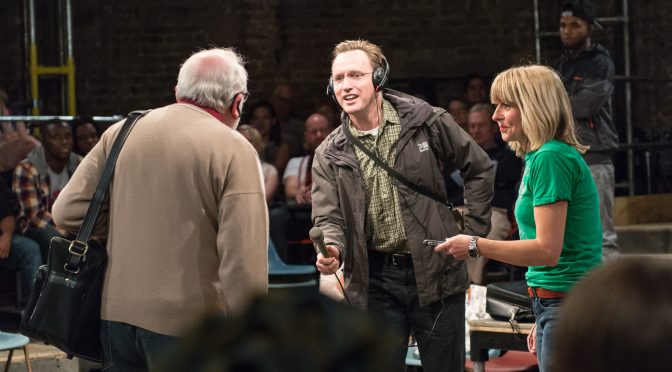All hail Alecky Blythe, of London Road fame and Queen of verbatim theatre, whose new work Little Revolution is currently playing at the Almeida. When rioters ran amok in the capital in 2011, Blythe took to the streets with her Dictaphone and recorded what they said to her. Having editing the interviews, she presents an intimate take on events, using performers who listen to the recordings, via headphones, on stage and recreate the dialogue.
The verbatim technique isn’t easy; there’s a danger subjects appear manipulated and there can be an air of worthy documentary. The masterstroke here is that Blythe joins the performers, repeating her own questions and copying all the stutters, nervous laughs and hesitations that are the mark of real conversations. Blythe is enormously endearing, an innocent abroad with a microphone, mocking herself as much anyone, truly making the show.
Little Revolution is surprisingly funny. Comments no playwright would ever dare to get away with come straight from people’s mouths: a trio of young girls straight out of Little Britain, middle-class angst and a German journalist too clichéd to be believed. There’s little menace, more a sense of confusion as people try to work out what is going on. Blythe doesn’t delve deeply into the causes of the riots – although plenty of ideas are raised, none is explored – instead, attention is given to the effects of violence on an already fractured community.
That London is divided by gentrification isn’t exactly news. But Joe Hill-Gibbins’ tight direction appreciates that Blythe’s work brings this important issue home to us. The focus is local campaigning that kicked in just after the riots. Wealthy hippies try to help a looted shopkeeper, while mums on a council estate campaign to ‘decriminalise Hackney youth’. There’s friction between the groups, epitomised by a street party courtesy of Marks & Spencer, but though arguments are presented swiftly the play is never simplistic.
The cast is good, Imogen Stubbs and Ronnie Ancona standing out through their stage presence. More noteworthy is a ‘community chorus’ joining the professional actors and used by Hill-Gibbins to create a sense of scale and a casual feeling. Again this stems from Blythe. She likes people and her interest is contagious. Dramatically reconfiguring the Almeida space further enforces a sense of informality and investigation to create an atmosphere quite unlike your regular night out at the theatre.
Until 4 October 2013
Photo by Manuel Harlan
Written 12 September 2014 for The London Magazine

